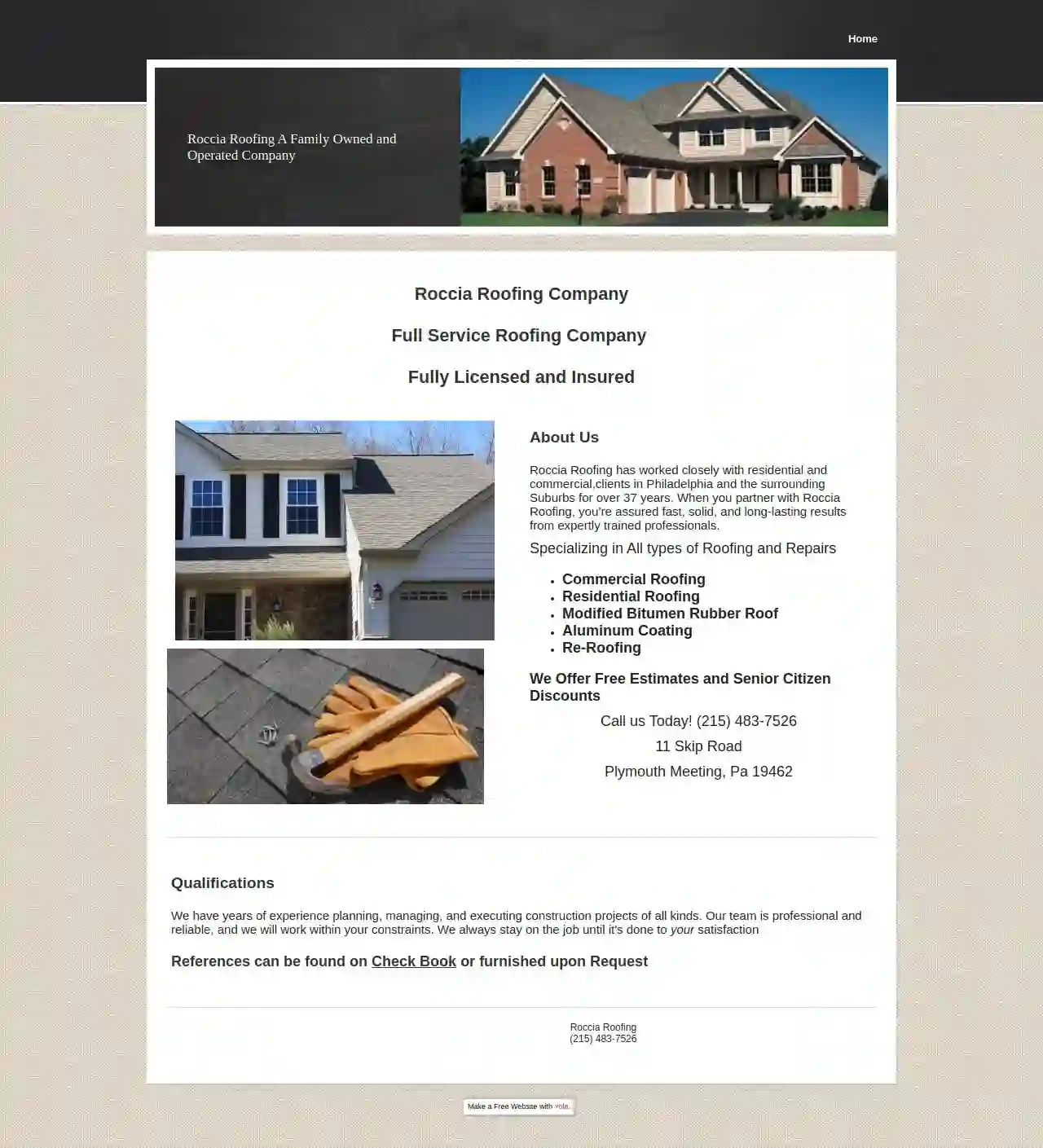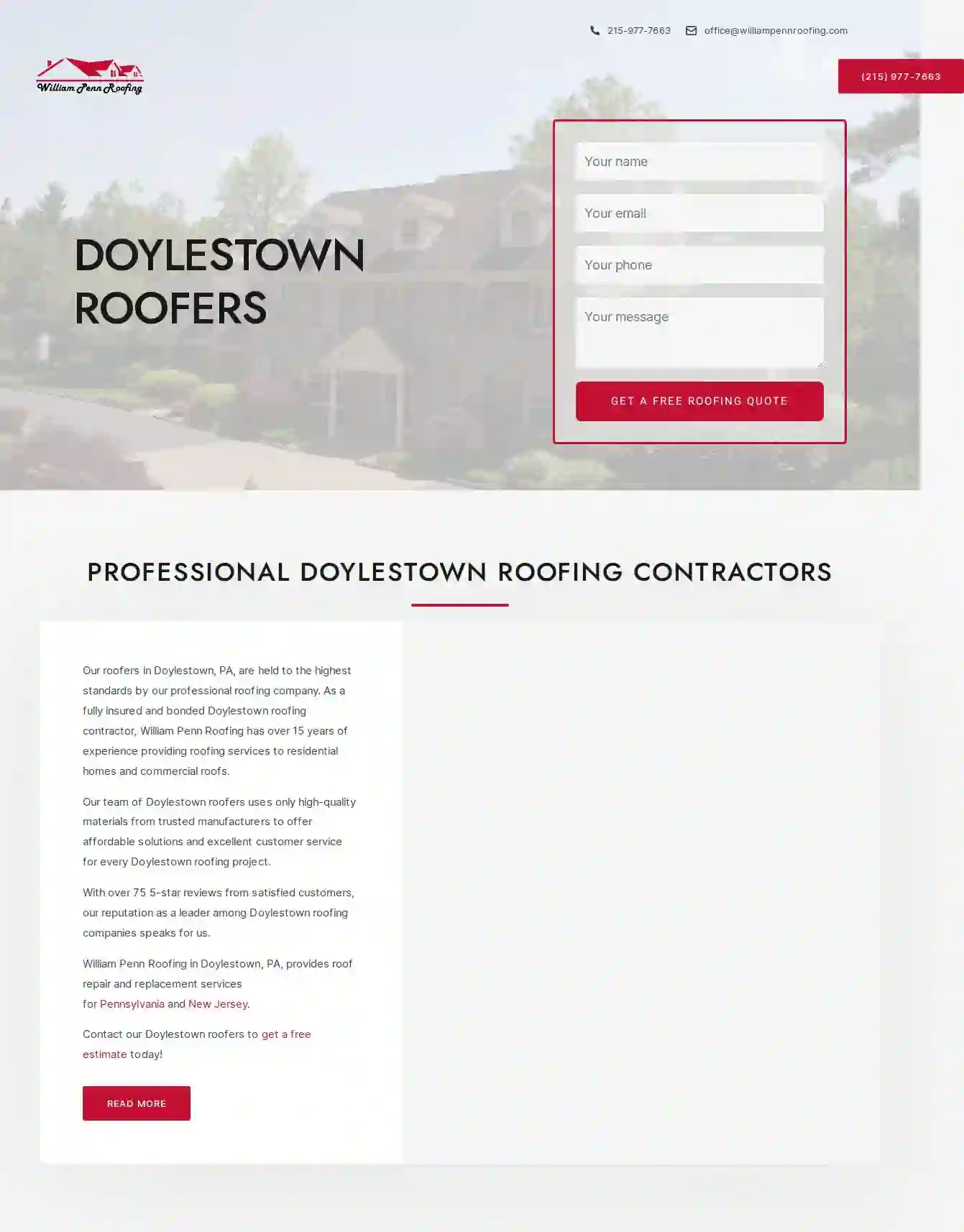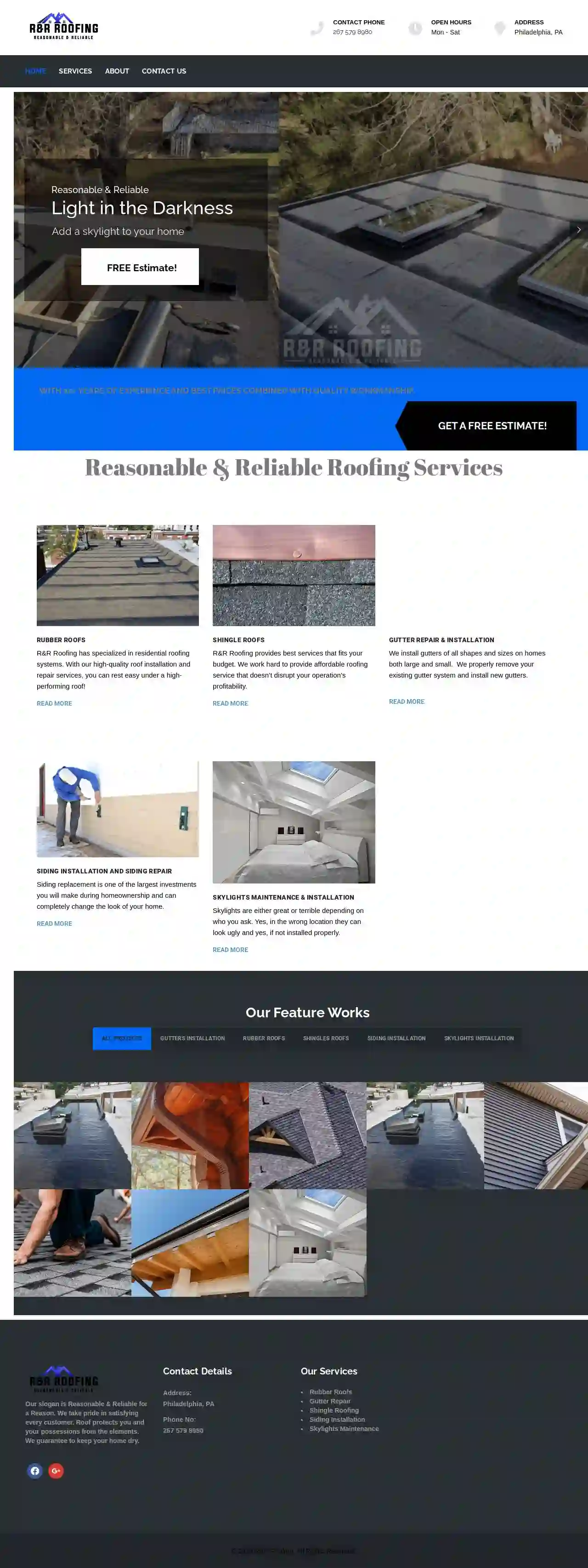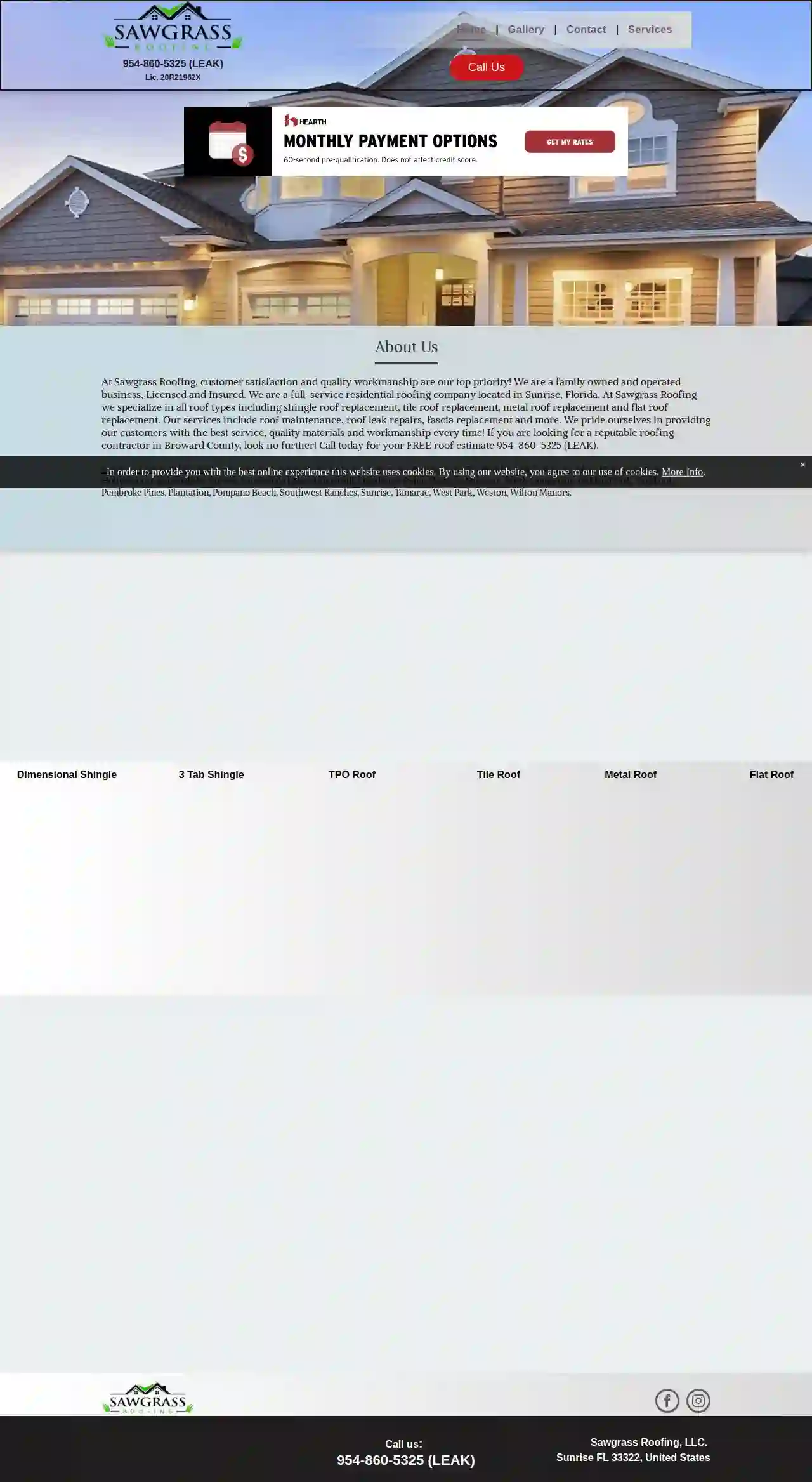Roofing Companies Carnegie
Find the best Roofing Service in Carnegie
Receive 3 FREE Roofing Company quotes for your project today! Compare profiles, reviews, accreditations, portfolio, etc... and choose the best deal.

Roccia Roofing Co
4.25 reviewsPlymouth Meeting, PA, 611 Skip Road, 19462, USRoccia Roofing is a family-owned and operated company that has worked closely with residential and commercial clients in Philadelphia and the surrounding suburbs for over 37 years. We are a full-service roofing company that is fully licensed and insured. Our team of expertly trained professionals specializes in all types of roofing and repairs, including commercial roofing, residential roofing, modified bitumen rubber roof, aluminum coating, and re-roofing. We offer free estimates and senior citizen discounts. Our qualifications include years of experience planning, managing, and executing construction projects of all kinds. We are professional, reliable, and will work within your constraints to ensure that the job is done to your satisfaction. References can be found on Check Book or furnished upon request.
- Services
- Why Us?
- Gallery
Get Quote
USA Roof Masters
4.8269 reviewsBuilding 1, Suite 214, 3070 Bristol Pike, Bensalem, 19020, USUSA Roof Masters is a roofing and home improvement company serving Eastern PA and Southern NJ. We have been in business since 2009 and have a team of experienced professionals who are dedicated to providing excellent service and quality workmanship. We offer a wide range of services including traditional roofing, metal roofing, slate roofing, cedar roofing, siding, gutters, and storm damage repairs. Our mission is to provide excellence in roofing through quality, service, and trust, and we commit to superior craftsmanship, customer satisfaction, and lasting solutions, building stronger communities one roof at a time.
- Services
- Why Us?
- Accreditations
- Gallery
Get Quote
Thomas James Roofing and Waterproofing
4.936 reviewsRego Park, Rego Park, NY, USThomas James Roofing and Waterproofing is a local, family-owned company that has been caring for its neighbors' homes and businesses for over 40 years. With a team of experienced and attentive professionals, we provide dependable, customized solutions for all your roofing, gutter, and waterproofing needs. Our commitment to customer satisfaction is evident in our 'A+' rating from the Better Business Bureau and our four-time Angie's Super Service Award winner. We are proud to call Rego Park our home and happy to provide services throughout the five boroughs of New York City. Our customers are our neighbors and friends, which is why we treat every project as if it were our own.
- Services
- Why Us?
- Accreditations
- Gallery
Get Quote
William Penn Roofing
4.984 reviews1795 S Easton Rd Suite#2, Doylestown, 18901, USWilliam Penn Roofing is a Doylestown Roofing Contractor serving the local community since 2008. We pride ourselves on providing outstanding roofing service to all our customers. Our philosophy centers around executing our services with excellence and putting our customers first. We are a fully insured and bonded Doylestown roofing contractor with over 15 years of experience providing roofing services to residential homes and commercial roofs. Our team of Doylestown roofers uses only high-quality materials from trusted manufacturers to offer affordable solutions and excellent customer service for every Doylestown roofing project. We are an experienced team of roofing contractors in Doylestown. If your roof can't be fixed, we provide roofing services such as roof replacement. Whether your home has a metal roof, a wood roof like cedar shake, or uses asphalt shingles, our Doylestown roofing company has experience with all roofing materials. When a commercial, industrial, or warehouse needs a commercial roofing contractor, businesses can depend on our team of Doylestown flat roofers to do the job right the first time.
- Services
- Why Us?
- Accreditations
- Our Team
- Testimonials
- Gallery
Get Quote
City Wide Roofing Inc
4.172 reviews7337 Wissinoming St, Philadelphia, 19136, USCity Wide Roofing is a full service roofing contractor handling both residential and commercial projects. From simple roof repairs or a roof replacement, City Wide is your Number ONE Philadelphia roofing company. We have years of experience and a diverse staff of experts from across the roofing industry. We take everything into account to give you the very best product to fit your needs. We have proven ourselves to be the best Philadelphia roofing company. Excellence in Roofing is more than just a tag line at City Wide Roofing; it is a way of doing business. With a long history of service in Philadelphia and the Tri-State area, the City Wide Roofing family demands a strong commitment to customer service and the highest quality standards of craftsmanship. Having received the prestigious Super Service Award by Angie's List recently, our vast experience has taught us the right way to install a roof, run a business and support the local community.
- Services
- Why Us?
- Testimonials
- Gallery
Get Quote
Farrell’s Roofing
530 reviewsFive Greentree Centre, 525 Route 73 North, STE 104, Marlton, 08053, USFARRELL'S ROOFINGRoofing Experts You Can Trust. Serving Philadelphia, Bucks County. Montgomery County, & New Jersey. Call Now (215) 501-0276 Trusted In Philadelphia For Over 23 Years!Farrell’s Roofing is a family owned & operated roofing company serving the Philadelphia and surrounding areas since 1997. Our services include Roofing, Siding, Gutters, Shingles, Capping, Silver Coat & More! We are Licensed and Insured for residential and Commercial work. Quality Roofing Services. No matter what type of project you need completed, our team here at Farrell’s Roofing can handle it. From new roof installations on commercial buildings to roof repair on a leaky home roof, Farrell’s Roofing provides prompt, high-quality work on time and within budget. Along with our years of expertise, we offer a labor guarantee in addition to manufacturer warranties on our roofing materials. That way, you can rest easy knowing that your property’s roof is protected for years to come. Learn More Why Farrell’s Roofing? We don’t believe in the one-size-fits-all method. We provide our services based on our customer’s individual needs. Farrell’s Roofing Founder Ray Farrell put it this way, “We dedicate our personal attention to each job. We understand that each situation is unique, and we strive to create a flexible solution that caters to our customer’s needs and budget.” So When you’re looking for a roofing company that has your best interest at heart, you can find confidence in choosing Farrell’s Roofing of Philadelphia! Learn More Check out some our recent work.Here’s a preview of some of the work we did in 2020-2021. It’s all about quality.Our dedication to customer satisfaction has been the key to our longevity as a leading roofing contractor in Philadelphia. And we have an extensive list of satisfied customers to prove it. In fact, customer service and quality craftsmanship are the cornerstones of our business at Farrell’s Roofing.We have a dedicated, experienced team who are eager to answer all of your questions and address any of your concerns. Each of our team members have been in the roofing & construction industry for many years and carry extensive knowledge with even the most complicated of roof projects. We pride ourselves in being true roofing industry professionals.Farrell’s Roofing of Philadelphia is a "full service" roofing company, with hundreds of roofing and rain gutter installations across Philadelphia & the Tri State area. Our re-roof projects have covered everything from asphalt shingles, wood shakes, tile roofs, standing seam metal roofs, roof coatings and single-ply roof systems, to a variety of services from roof maintenance, roof repairs, solar installations and rain gutters. All of our clients are treated with the "personal touch" that Farrell's Roofing has become known for. No roofing project is too big or too small for us.
- Services
- Why Us?
- Gallery
Get Quote
R&R Roofing Services
4.853 reviewsPhiladelphia, PA, USReasonable & Reliable Roofing Services R&R Roofing has specialized in residential roofing systems. With our high-quality roof installation and repair services, you can rest easy under a high-performing roof! We offer you the best prices and fully featured Roofing Services. All of our new roofs are Guaranteed for a period of 15 years. Our slogan is Reasonable & Reliable. We take pride in satisfying every customer. Hiring a roofer should not be taken lightly. With 20+ years of experience and best prices combined with quality workmanship.
- Services
- Why Us?
- Gallery
Get Quote
Atlantic Roofing & Siding LLC
41 reviews491 Coral Lane, Manahawkin, 08050, USWelcome to Atlantic Roofing & Siding. If you’re in the market for a new roof or siding, you’ve come to the right place! We’ve been installing roofing and siding in the Ocean County area for over 25 years. Whether you are in LBI, Barnegat, Manahawkin, Lacey Township or any surrounding area, we want to hear from you! We are licensed and fully insured roofing and siding contractors. We are a local company with years of experience that you can trust. If you are experiencing a leaky roof, or perhaps dealing with an old roof near it’s end of life (usually over 20 years old), we are here to help. Are you looking to enhance the curb appeal of an older home? Consider vinyl siding to give your home a whole new look! Looking for roof repair in Ocean County, Monmouth County or Atlantic County?? Atlantic Roofing and Siding is also available for roofing repairs as well as inspections. If you’re not sure if you need a new roof, our expert roofers can point you in the right direction. All of our work is guaranteed, so you can have some peace of mind when the work is complete.
- Services
- Why Us?
- Gallery
Get Quote
M.A. Thompson Roofing
531 reviewsPittsburgh, USFor almost 50 years, M.A. Thompson Roofing has provided complete home exterior solutions to North Hills families, including roofs, gutters, siding, soffit, fascia, and windows. Our founder, Big Mike, established the “M.A.T. Way” to ensure customer satisfaction on every project we are a part of. We’ve condensed this into the acronym QEC – Quality, Experience, and Community. Our team takes extraordinary pride in the Quality of our work, ensuring roofs last their full lifespan with proper installation and maintenance. Many roofs fall short of this timeline due to corners cut during installation. At M.A. Thompson, we go the extra mile – whether it be completely removing your old roof, installing superior flashing, or precisely nailing every shingle. We even leave your yard cleaner than when we found it! The end does not justify the means at M.A. Thompson. Our customer Experience, from initial inquiry to the final punch out, is just as important as the project itself. Many contractors continue to work today like their forefathers from 1950 – carbon copy proposals, a phone number that goes into an unchecked voicemail, and half-hearted inspections that invariably end with “you need a new roof.” Our team offers the option you want, from seamless online interactions to traditional face-to-face discussions. Finally, every member of M.A. Thompson’s team lives and works in the Community. You’ll see our trucks at a light on McKnight Road, our names on youth soccer jerseys at Middle Road fields, or our people in a Sheetz grabbing an energy drink for the next job. We’ve earned the trust of our neighbors over the years because for us, it’s not just about professional work—it’s personal.
- Services
- Why Us?
- Accreditations
- Our Team
- Testimonials
- Gallery
Get Quote
Sawgrass Roofing LLC
541 reviewsSunrise, 33322, USWelcome to Sawgrass Roofing, LLC. "Taking roofing to a higher level" Free Estimates!Se habla españolLicensed & Insured At Sawgrass Roofing, customer satisfaction and quality workmanship are our top priority! We are a family owned and operated business, Licensed and Insured. We are a full-service residential roofing company located in Sunrise, Florida. At Sawgrass Roofing we specialize in all roof types including shingle roof replacement, tile roof replacement, metal roof replacement and flat roof replacement. Our services include roof maintenance, roof leak repairs, fascia replacement and more. We pride ourselves in providing our customers with the best service, quality materials and workmanship every time! If you are looking for a reputable roofing contractor in Broward County, look no further! Call today for your FREE roof estimate 954-860-5325 (LEAK). Serving all Broward County: Coconut Creek, Cooper City, Coral Springs, Dania Beach, Davie, Deerfield Beach, Fort Lauderdale, Hallandale Beach, Hollywood, Lauderdale by the Sea, Lauderdale Lakes, Lauderhill, Lighthouse Point, Margate, Miramar, North Lauderdale, Oakland Park, Parkland, Pembroke Pines, Plantation, Pompano Beach, Southwest Ranches, Sunrise, Tamarac, West Park, Weston, Wilton Manors.
- Services
- Why Us?
- Gallery
Get Quote
Over 17,196+ Roofing Contractors onboarded
Our roofing contractors operate in Carnegie and beyond!
Roofyng.com has curated and vetted the Best Roofers in and around Carnegie. Find a reliable contractor today.
Frequently Asked Questions About Roofing Companies
- Asphalt Shingles: 20-30 years
- Metal Roofing: 40-70 years
- Tile Roofing: 50-100 years or more (clay and slate)
- Flat Roofing: 15-30 years (depending on material)
- Slate: 100 years or more
- Wood Shakes or Shingles: 30-50 years (with proper maintenance)
- Experience: 'How long have you been in business, and what experience do you have with similar projects?'
- Licensing and insurance: 'Are you licensed and insured, and can I see proof of coverage?'
- Warranties: 'What warranties do you offer on your work and the materials used?'
- References: 'Can you provide references from past clients?'
- Project Timeline: 'What is the estimated timeline for completing the project?'
- Payment Terms: 'What are your payment terms, and do you require a deposit?'
- Communication: 'How will you keep me updated on the project's progress?'
- Cleanup: 'What steps will you take to protect my property during the project and ensure proper cleanup afterward?'
- Choose Reflective Roofing Materials: Opt for light-colored shingles or metal roofing that reflects sunlight and reduces heat absorption.
- Install Proper Attic Insulation: Adequate insulation prevents heat loss in the winter and heat gain in the summer.
- Ensure Adequate Ventilation: Proper attic ventilation allows hot air to escape, reducing cooling costs and extending the lifespan of your roof.
- Consider a Radiant Barrier: In hot climates, a radiant barrier installed in the attic can reflect heat away from the roof, further reducing cooling needs.
- Style: Consider your home's architectural style and choose a roofing material that complements it.
- Climate: Factor in your local climate conditions. Some materials perform better in extreme heat, cold, or high winds than others.
- Budget: Roofing materials have a wide range of costs. Determine your budget and choose materials that fit your financial constraints.
- Durability and Lifespan: Assess the expected lifespan and durability of different materials.
- Energy Efficiency: Choose materials with good insulation and reflectivity properties to improve your home's energy efficiency.
How long does a roof typically last?
What questions should I ask a roofing contractor?
How can I make my new roof more energy-efficient?
How do I choose the right roofing materials for my home?
How long does a roof typically last?
- Asphalt Shingles: 20-30 years
- Metal Roofing: 40-70 years
- Tile Roofing: 50-100 years or more (clay and slate)
- Flat Roofing: 15-30 years (depending on material)
- Slate: 100 years or more
- Wood Shakes or Shingles: 30-50 years (with proper maintenance)
What questions should I ask a roofing contractor?
- Experience: 'How long have you been in business, and what experience do you have with my type of roof?'
- Licensing and insurance: 'Are you licensed and insured, and can I see proof of coverage?'
- Warranties: 'What warranties do you offer on your work and the materials used?'
- References: 'Can you provide references from past clients?'
- Project Timeline: 'What is the estimated timeline for completing the project?'
- Payment Terms: 'What are your payment terms, and do you require a deposit?'
- Communication: 'How will you keep me updated on the project's progress?'
- Cleanup: 'What steps will you take to protect my property during the project and ensure proper cleanup afterward?'
How can I make my new roof more energy-efficient?
- Choose Reflective Roofing Materials: Opt for light-colored shingles or metal roofing that reflects sunlight and reduces heat absorption.
- Install Proper Attic Insulation: Adequate insulation prevents heat loss in the winter and heat gain in the summer.
- Ensure Adequate Ventilation: Proper attic ventilation allows hot air to escape, reducing cooling costs and extending the lifespan of your roof.
- Consider a Radiant Barrier: In hot climates, a radiant barrier installed in the attic can reflect heat away from the roof, further reducing cooling needs.
How do I choose the right roofing materials for my home?
- Style: Consider your home's architectural style and choose a roofing material that complements it.
- Climate: Factor in your local climate conditions. Some materials perform better in extreme heat, cold, or high winds than others.
- Budget: Roofing materials have a wide range of costs. Determine your budget and choose materials that fit your financial constraints.
- Durability and Lifespan: Assess the expected lifespan and durability of different materials.
- Energy Efficiency: Choose materials with good insulation and reflectivity properties to improve your home's energy efficiency.